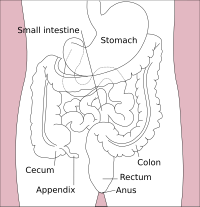
Photo from wikipedia
Background/aims This study evaluates the performance of the Airdoc retinal artificial intelligence system (ARAS) for detecting multiple fundus diseases in real-world scenarios in primary healthcare settings and investigates the fundus… Click to show full abstract
Background/aims This study evaluates the performance of the Airdoc retinal artificial intelligence system (ARAS) for detecting multiple fundus diseases in real-world scenarios in primary healthcare settings and investigates the fundus disease spectrum based on ARAS. Methods This real-world, multicentre, cross-sectional study was conducted in Shanghai and Xinjiang, China. Six primary healthcare settings were included in this study. Colour fundus photographs were taken and graded by ARAS and retinal specialists. The performance of ARAS is described by its accuracy, sensitivity, specificity and positive and negative predictive values. The spectrum of fundus diseases in primary healthcare settings has also been investigated. Results A total of 4795 participants were included. The median age was 57.0 (IQR 39.0–66.0) years, and 3175 (66.2%) participants were female. The accuracy, specificity and negative predictive value of ARAS for detecting normal fundus and 14 retinal abnormalities were high, whereas the sensitivity and positive predictive value varied in detecting different abnormalities. The proportion of retinal drusen, pathological myopia and glaucomatous optic neuropathy was significantly higher in Shanghai than in Xinjiang. Moreover, the percentages of referable diabetic retinopathy, retinal vein occlusion and macular oedema in middle-aged and elderly people in Xinjiang were significantly higher than in Shanghai. Conclusion This study demonstrated the dependability of ARAS for detecting multiple retinal diseases in primary healthcare settings. Implementing the AI-assisted fundus disease screening system in primary healthcare settings might be beneficial in reducing regional disparities in medical resources. However, the ARAS algorithm must be improved to achieve better performance. Trial registration number NCT04592068.
Journal Title: British Journal of Ophthalmology
Year Published: 2023
Link to full text (if available)
Share on Social Media: Sign Up to like & get
recommendations!